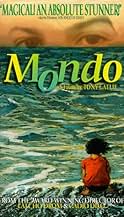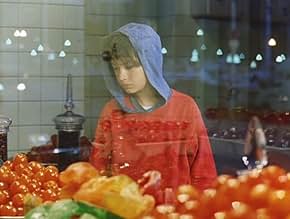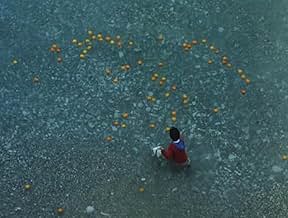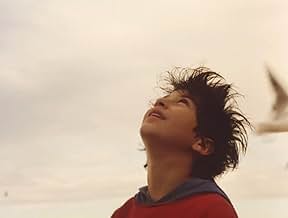Mondo is a homeless young boy, with a big smile, who wanders around Nice looking for food and a place to sleep.Mondo is a homeless young boy, with a big smile, who wanders around Nice looking for food and a place to sleep.Mondo is a homeless young boy, with a big smile, who wanders around Nice looking for food and a place to sleep.
- Director
- Writers
- Stars
- Awards
- 1 win total
- Director
- Writers
- All cast & crew
- Production, box office & more at IMDbPro
Featured reviews
This film is similar to "The Sixth Sense" in that what you see is not what is reality. The ending is truly enlightening and makes the entire film come together. Of course I will not reveal the ending.
Pay attention to the early scenes. However, I didn't see the necessity of the nude scene in the middle of the film, nor the Muslim correlation.
But regardless, a quality film. If purchasing, beware of the edited versions and ensure you are purchasing the uncut version.
The acting is of high quality and the character development is first-rate. We truly feel the emotional attachments of the principals and also that of the bystanders who really contribute to the story line as did the townspeople in "The Emperor's New Clothes"
Pay attention to the early scenes. However, I didn't see the necessity of the nude scene in the middle of the film, nor the Muslim correlation.
But regardless, a quality film. If purchasing, beware of the edited versions and ensure you are purchasing the uncut version.
The acting is of high quality and the character development is first-rate. We truly feel the emotional attachments of the principals and also that of the bystanders who really contribute to the story line as did the townspeople in "The Emperor's New Clothes"
Mondo is based on a short story by French author J.M.G. Le Clézio. The story is the first in a collection of stories about children. In each narrative a child is in some way alienated from the dominant culture while at the same time embodying something that this culture is missing.
In Gatlif's retelling, Mondo is alienated by the busy consumer society of Nice, France: he is always hiding from city officials who try to arrest him and he feels ill-at-ease in the bustling downtown area. He makes his home among the other marginalized Niçois: the homeless, foreigners, gypsies, etc. Gatlif artfully frames the life of Mondo and his friends and makes the viewer feel sympathy for society's rejects.
Gatlif shows how Mondo changes people who let him into their lives while demonstrating the blindness of government agencies that deal with stray children.
An excellent film. Even my children love it.
In Gatlif's retelling, Mondo is alienated by the busy consumer society of Nice, France: he is always hiding from city officials who try to arrest him and he feels ill-at-ease in the bustling downtown area. He makes his home among the other marginalized Niçois: the homeless, foreigners, gypsies, etc. Gatlif artfully frames the life of Mondo and his friends and makes the viewer feel sympathy for society's rejects.
Gatlif shows how Mondo changes people who let him into their lives while demonstrating the blindness of government agencies that deal with stray children.
An excellent film. Even my children love it.
I thought it was great when the old man was teaching Mondo to spell with letters scratched onto rocks and Mondo scooped up all the letters in his name and carried them off in his pockets. There's something about a name, isn't there? --
This film is a must-see, like Gatlif's Latcho Drom. It is poetic, cinematically poetic. There are several moments that brought me to tears, out of the sheer beauty of the human emotion expressed in acting and photography. "Acting" does not sound right - you have the impression you are watching real people living out love in their actual souls.
This little-known film turned out to be a gem.
Mondo is a young vagrant boy living in Nice. He is free-spirited, joyful and does what he wants, with nobody telling him what to do. He would spend time walking the streets of Nice, go for a swim in the sea or join a lonely fisherman on the pier. Mondo is mostly met with a lot of goodwill. He would get cuts of freshly baked bread from the kind lady at the bakery, or fresh fruit from the open-air market. Mondo has many friends; we see him joining a beggar who has a suitcase with two beloved white doves, and meeting a busker whose effort he assists by passing his money collecting plate around. Then there is the childless Vietnamese lady who takes Mondo in and cares for him when he falls sick.
The antagonists in the story are 'welfare' officials who are out to capture Mondo and take away his freedom. In a disturbing allegory we witness how other officials catch stray dogs to take to the pound. Would Mondo escape the officials and retain his freedom?
Mondo seems mythical; he may not even be real. The film subtly compares the cost of conformity with that of freedom and individuality.
This film superficially may seem to be thin on the plot, but believe me, it is not a simple as it seems. Watch it carefully; it has a lot to offer below the surface.
This film speaks to the senses. The sound of a knife cutting through a crusty loaf of bread, the soothing splash of swells lapping against the side of a boat. Excellent cinematography accentuates the visual. A few memorable scenes: Rainwater collecting on a water-lily leaf; a wet but seemingly happy Mondo sheltering from the rain whilst a bedraggled and soaked dog in the next scene looks everything but happy; an insect moving to the sheltered side of a leaf as the rain continues. A small boat pulling against its mooring in the ebb of the tide. And then there is the surreal scene of oranges, with messages written all over them, washing up onto the beach. The attention to detail is remarkable. The soundtrack is excellent too.
'Mondo' reminds me of the importance of appreciating the world around us for what it is, uncluttered by preconceptions or indifference.
The young actor who plays Mondo, Ovidiu Balan, does so with distinction. The performances by the other actors (Philippe Petit, Schahia Aalam, Pierette Fesch, Jerry Smith and Maurice Maurin) are excellent too. The director, Tony Gatlif must be commended for producing this rewarding and splendid meditative work of art.
I score 'Mondo' a well-deserved 9/10.
Mondo is a young vagrant boy living in Nice. He is free-spirited, joyful and does what he wants, with nobody telling him what to do. He would spend time walking the streets of Nice, go for a swim in the sea or join a lonely fisherman on the pier. Mondo is mostly met with a lot of goodwill. He would get cuts of freshly baked bread from the kind lady at the bakery, or fresh fruit from the open-air market. Mondo has many friends; we see him joining a beggar who has a suitcase with two beloved white doves, and meeting a busker whose effort he assists by passing his money collecting plate around. Then there is the childless Vietnamese lady who takes Mondo in and cares for him when he falls sick.
The antagonists in the story are 'welfare' officials who are out to capture Mondo and take away his freedom. In a disturbing allegory we witness how other officials catch stray dogs to take to the pound. Would Mondo escape the officials and retain his freedom?
Mondo seems mythical; he may not even be real. The film subtly compares the cost of conformity with that of freedom and individuality.
This film superficially may seem to be thin on the plot, but believe me, it is not a simple as it seems. Watch it carefully; it has a lot to offer below the surface.
This film speaks to the senses. The sound of a knife cutting through a crusty loaf of bread, the soothing splash of swells lapping against the side of a boat. Excellent cinematography accentuates the visual. A few memorable scenes: Rainwater collecting on a water-lily leaf; a wet but seemingly happy Mondo sheltering from the rain whilst a bedraggled and soaked dog in the next scene looks everything but happy; an insect moving to the sheltered side of a leaf as the rain continues. A small boat pulling against its mooring in the ebb of the tide. And then there is the surreal scene of oranges, with messages written all over them, washing up onto the beach. The attention to detail is remarkable. The soundtrack is excellent too.
'Mondo' reminds me of the importance of appreciating the world around us for what it is, uncluttered by preconceptions or indifference.
The young actor who plays Mondo, Ovidiu Balan, does so with distinction. The performances by the other actors (Philippe Petit, Schahia Aalam, Pierette Fesch, Jerry Smith and Maurice Maurin) are excellent too. The director, Tony Gatlif must be commended for producing this rewarding and splendid meditative work of art.
I score 'Mondo' a well-deserved 9/10.
Details
- Runtime
- 1h 20m(80 min)
- Color
Contribute to this page
Suggest an edit or add missing content


















